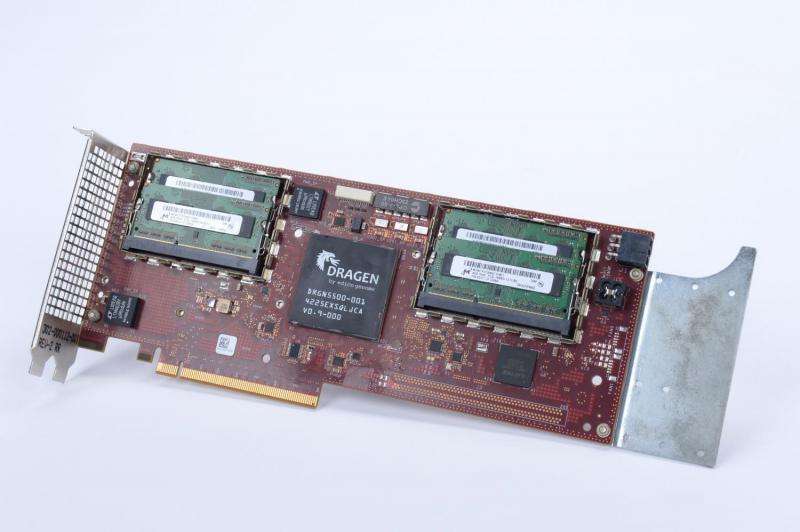Hot processor speeds up UK genome analysis

TGAC's high performance computing (HPC) infrastructure will benefit from the addition of Edico Genome's DRAGEN, the world's first processor designed to analyse specific sequencing data tasks. DRAGEN will be used to accelerate TGAC's next-generation sequencing workflows.
Initial evaluations of DRAGEN showed that mapping against the ash tree genome was 177 times faster per processing core than TGAC's local HPC systems, requiring only 7 minutes instead of 3 hours on one of the larger datasets. Alignment runs on the rice genome that take approximately two hours on TGAC's HPC servers took just three minutes using DRAGEN.
Project Lead Dr Tim Stitt, Head of Scientific Computing at TGAC, said: "We are really excited to be Edico Genome's first DRAGEN customer in the U.K., and we hotly anticipate utilising this ground-breaking technology to advance our mission to promote a sustainable bio-economy and maintain the U.K.'s food security.
"In particular, we are really interested to see how DRAGEN handles the wheat genome, which is five times bigger than the human genome and much more complex. Wheat is the staple diet for over 35 percent of the world's population, which is predicted to increase to 9 billion people by 2050.
"By understanding the genomic building blocks of wheat, and its diversity, we can better inform breeders on how to improve their yields, particularly in areas where wheat is prone to disease and drought. Obviously the sooner we do this the better and DRAGEN can greatly help us in this mission.
"Alignment against reference genomes is a fundamental task undertaken daily by TGAC researchers. Thanks to our partnership with Edico Genome, our DRAGEN system will contain both genome and transcriptome highly optimised analysis pipelines."
"TGAC is proud to be a leader in bringing new and disruptive technologies into the hands of the bioscience community and our collaboration with Edico Genome continues to illustrate our leadership in this area."
The DRAGEN Bio-IT Processor is integrated on a PCIe card and available in a pre-configured server, enabling seamless integration into bioinformatics workflows. DRAGEN is highly reconfigurable, using a field-programmable gate array (FPGA) to provide hardware-accelerated implementations of BCL conversion, compression, mapping, alignment, sorting, duplicate marking, haplotype variant calling and joint genotyping.
The DRAGEN system therefore, is much faster than traditional approaches that execute algorithmic implementations in software. In a recent study published in Genome Medicine, DRAGEN sped up analysis of a whole genome from 22.5 hours to 41 minutes, while also achieving sensitivity and specificity of 99.5 percent. Similar efficiency gains could make an enormous impact due to the high throughput of genomic data processed at TGAC, where sequence alignment is critical to many sequencing projects.
"Our collaboration with TGAC, a powerhouse in genomics that is home to one of the largest computing hardware facilities in Europe, is a great example of the benefits DRAGEN holds for sequencing centres," said Pieter van Rooyen, PhD, Chief Executive Officer of Edico Genome. "We look forward to continuing to work with researchers and clinicians around the world with a need to analyse next-generation sequencing data rapidly and cost effectively without compromising accuracy."
TGAC is strategically funded by BBSRC and operates a National Capability to promote the application of genomics and bioinformatics to advance bioscience research and innovation.
Journal information: Genome Medicine
Provided by The Genome Analysis Centre




















